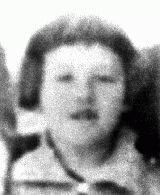
Helen Lebowitz
Born: July 9, 1928
Vološanka, Czechoslovakia
Helen was one of seven children born to a Jewish family in Vološanka, a village in Subcarpathian Rus. Nestled in the Carpathian mountains, Vološanka was a small town with a thriving Jewish community. Jewish life revolved around the town's synagogue. Helen grew up in a close-knit family; many relatives lived nearby. Her father, Martin, owned a shoe store in the town and her mother, Rose (née Moskowitz), took care of the home and children.
1933-39: In spring 1939, when Helen was 10 years old, Hungary annexed the region. Now under Hungarian rule, the Lebowitz family was subjected to the Hungarian government’s antisemitic laws. These laws restricted Jewish economic life and defined Jews racially. Helen attended public school, where she experienced discrimination from the teachers. Eventually her father was forced to give up his business, and the family had to rely on the few livestock her grandparents still owned for food.
1940-44: In March 1944, Nazi Germany occupied Hungary. Jews throughout Hungary were ordered to wear a Jewish star. Many able-bodied Jewish men, including Helen’s father and two older brothers, were sent to perform forced labor. In mid-April, Hungarian gendarmes rounded up Jews in Vološanka and sent them to the Ungvár transit ghetto. The Hungarian gendarmes in charge of the ghetto were cruel and publicly humiliated Helen’s grandfather by beating him and cutting off his beard. In late May, she and her family were deported to Auschwitz. There, an SS man beat Helen’s grandfather to death for refusing to desecrate his Torah scroll. His terrified family watched helplessly as his body was thrown into the back of a truck. Her grandmother, her mother, and two of her siblings were murdered in the gas chambers upon arrival. Helen and her older sister Sylvia were selected for labor. They remained in Auschwitz for about five weeks, before they were sent to a different camp in Germany to perform forced labor.
Toward the end of the war, Helen was transferred to the Bergen-Belsen camp, where she was liberated on April 15, 1945. She immigrated to the United States in 1946.

